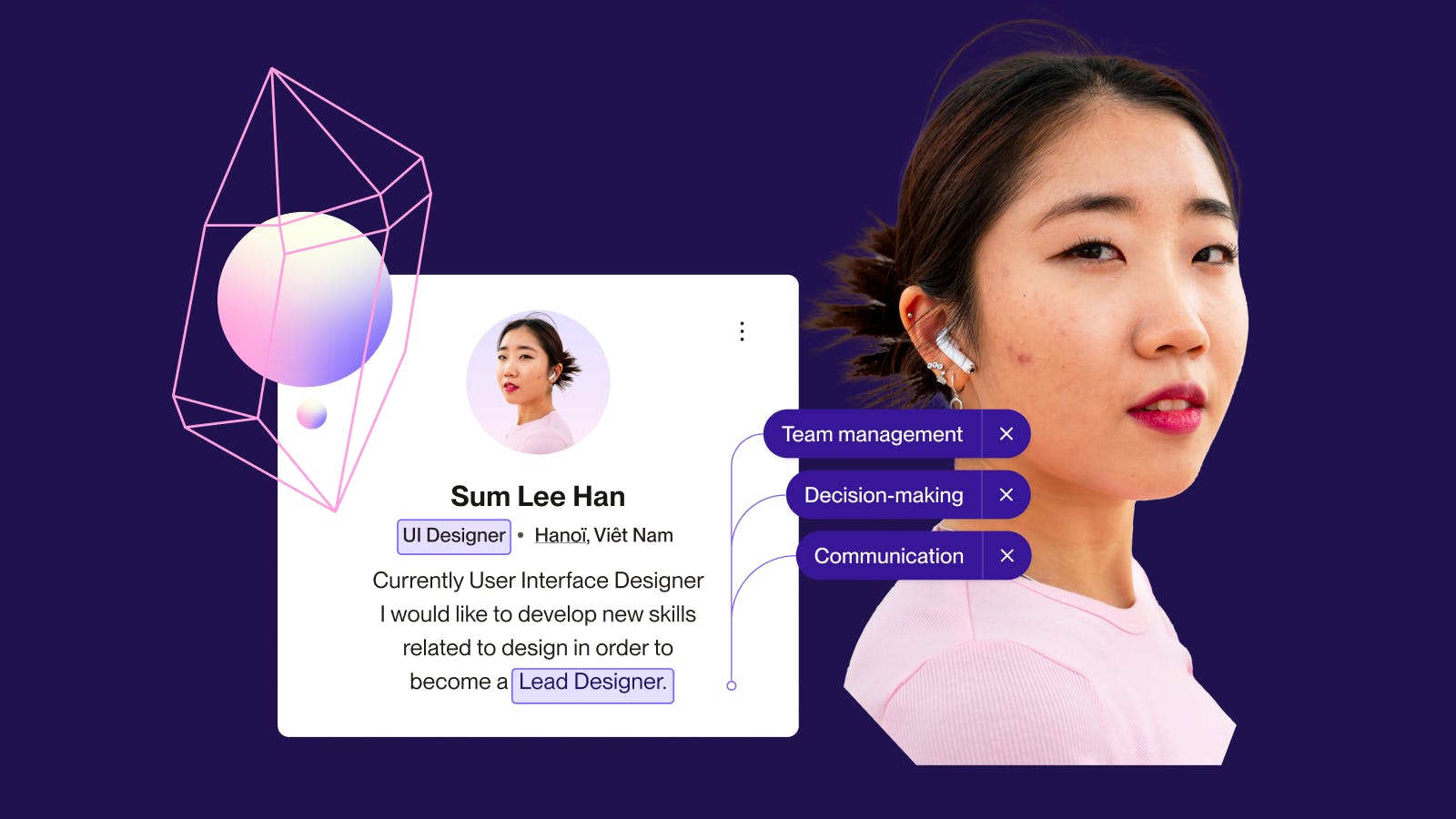What is data-driven decision-making in HR, and how is AI leveraging it?

In today’s business landscape, leveraging data for decision-making has never been more critical, and it has taught us that we can’t count solely on our intuition but that previous business and HR strategies are outdated. Organizations need concrete evidence and insights to thrive in the work environment and keep up with the market.
It’s more than evident that Human Resources is at the frontline in adapting its strategy to make better decisions based on data. This is mainly for talent management and engagement purposes, to face today’s challenges such as talent shortage.
Integrating AI, data analytics, and machine learning into HR operations represents a significant opportunity for HR to enhance its role as a strategic business partner and to innovate and customize the HR initiatives organizations offer.
If only 41% of HR professionals improved efficiency and drove business value through the skilled use of technology and data, the future of HR would be increasingly data-driven as technology for employee strategies has exploded. And as it’s in constant evolution, it will never be too late to get started.
In this article, we will deep dive into the definition of HR data-driven decision-making and how organizations can leverage AI and HR data analytics to empower their talent strategies through people analytics-informed decisions.
What is data-driven decision-making, and what does it mean for HR?
Definition of HR data-driven decision-making
Let’s start from the basement before reaching the roof: what is Data-driven decision-making?
It is a process where decision-makers collect, analyze, and interpret quantitative or qualitative data to make informed decisions. It ensures unbiased and oriented choices, especially for their strategies.
Data-driven decision-making for HR refers to the practice of using data and analytics to inform and guide human resources-related decisions within an organization. This approach involves different HR topics and processes such as employee performance metrics, recruitment data, engagement surveys, and demographic information.








“In the context of HR, data-driven decision-making involves leveraging HR data and analytics to drive strategic HR initiatives and improve overall organizational performance.”
Key benefits of data-driven decision-making in HR
By utilizing HR data and analytics, organizations can enhance their decision-making processes' precision and knowledge base. Data furnishes unbiased evidence, allowing HR leaders and managers to discern trends, gaps, and correlations to empower them to make more impactful decisions, deploy tailored interventions to tackle challenges, and refine HR processes and operations.
By harnessing data-driven insights, HR professionals can make enhanced decisions across a range of areas, including:
Recruitment and Selection:
Analyzing data on past hiring outcomes, candidate demographics, and performance metrics to improve the recruitment process, identify effective sourcing channels, and select candidates who best fit the organization.
Talent Management:
Organizations will be able to better understand their workforce, including their strengths and weaknesses. Utilizing data on employee skills, performance evaluations, training outcomes, and career aspirations helps to identify high-potential employees, address skill gaps, find areas of improvement, and develop targeted career paths and training programs.
This enables HR to develop more effective talent management strategies and make real-time action plans for engagement, performance, workforce planning, and succession.
Employee Engagement and Retention:
With HR data, organizations can identify factors that contribute to employee satisfaction, engagement, and well-being: employee survey data, feedback, and turnover rates… All these insights help to understand drivers of engagement and retention, identify areas for improvement in the employee experience, and implement initiatives to increase employee satisfaction and loyalty.
Employee Experience:
Organizations can improve their employee experience from the hiring process to offboarding by collecting data like skills, skills gaps, preferences and motivations, engagement rate, and more. It enables HR to improve employee experience with personalized training and skills development plans, create new career paths, develop a more positive work environment, and make wellness initiatives.
Performance Management:
Using data on individual and team performance metrics, goal achievement, and feedback to provide more objective and meaningful performance evaluations, identify areas for improvement, and align performance goals with organizational objectives.
Strategic Alignment:
Aligning your organization’s business goals with your employees' objectives and motivations is vital in this fast-paced business environment. Data-driven decision-making in HR actually enables organizations to align their HR strategies with overall organizations goals.
Collecting, analyzing, and comparing HR data to organizational context can help identify the most effective strategy for your organization's performance. HR leaders can then prioritize and allocate resources more effectively, ensuring that HR strategies line up with business and employees’ goals.
Workforce Planning:
Analyzing workforce demographics, turnover trends, and succession planning data to help forecast future talent needs, identify potential risks or shortages, and develop strategies to ensure a sustainable and skilled workforce.
Increased Efficiency:
Through the review of HR data, organizations can pinpoint inefficiencies and enact procedural enhancements that save time, reduce costs, and bolster overall HR operations. For instance, by scrutinizing data related to recruitment and onboarding procedures, organizations can uncover bottlenecks and refine these processes to attract and retain top talent more effectively.

How AI is revolutionizing people analytics and enabling HR professionals to make data-driven decisions
AI and analytics are reshaping HR
It’s not new that AI, analytics, and machine learning are reshaping the world of work. Integrating them into the HR processes is a fantastic opportunity to enhance their role as a strategic business partner of People Operations.
HR teams can now use AI to automate non-value-added and repetitive activities like legal requirements, holiday and pay allowances, etc, with several powerful tools that will give them time back to focus on more important tasks, enhancing their role as strategic allies while revolutionizing and tailoring HR initiatives. They’ll be able to plan for the future and focus on understanding how their organization will change, plus the skills that will be needed.
Consequently, HR professionals and leaders must grasp the potential benefits and obstacles of AI and machine learning.
HR has never been more important, especially now with the development of AI that is transforming organizations intensely. HR’s role is to be prepared and to arrange their teams, organizations, and workforce to face it as AI constantly challenges how we work and how HR teams do things.That’s why, HR must reskill and upskill themselves and their employees to be ready and adapt their strategy for this new challenge.
Using AI and technology to gain more insights through data analysis helps to understand what works and what doesn’t anymore and improve existing strategies - or change them completely. AI also helps collect and analyze data so HR teams can extract those insights more humanly and plan accordingly for their strategy and workforce.
AI and Generative AI hold the potential to revolutionize HR analytics by shifting from a pull to a push model, democratizing access to data insights across organizations. This transformation empowers individuals to effortlessly interact with data in their preferred format, enhancing strategic decision-making. Furthermore, advancements in synthetic data creation offers opportunities to securely share and analyze sensitive HR data, paving the way for a substantial evolution in people analytics practices within organizations over the coming years.
“We're seeing a complete transformation over the next five to ten years of how people analytics will be done in organizations... moving from a pull to a push concept... this helps HR teams who sometimes don't necessarily love data analysis, to analyze data and extract those insights in a much more human way.”
Data-driven decisions fuel skills-based organizations
When it comes to skills-based organizations, data-driven decisions play a pivotal role in fueling skills-based organizations, where the focus is on leveraging individual competencies to drive organizational success.
Data analytics can help organizations pinpoint areas where specific skills are lacking or outdated. By analyzing employee performance, feedback, and training outcomes, HR teams can identify skill gaps and prioritize areas for development. Organizations can also personalize training programs to address the specific needs of employees. This targeted approach ensures that resources are allocated efficiently, leading to enhanced skill development and performance improvement.
Last but not least, data analytics can provide valuable insights into employees' career aspirations, strengths, and areas for growth. By leveraging this information, organizations can offer tailored career development opportunities that align with individual skills and goals, increasing employee engagement and retention. It is also easier for HR teams to gain insights from industry trends, and market demands and compare them to internal skills data to forecast future skills requirements.
For example, an AI specialized in skills data can give great insights into what skills the company has, what skills their employees need to execute their roles better and be more effective, and what skills are trending on the market so they can bridge existing gaps. As a result, HR can then adapt their skills and talent development strategies on top of developing new learning and training plans.
More specifically, the rise of generative AI democratizes access to analytics, information, and skills across roles, personalizing skills development and career paths and improving the employee experience as a whole.
365Talents introduced its latest product release a few months ago, the 365Talents Skills Intelligence APIs. The solution is specifically designed to supercharge organizations in their skills-based organization transformation journey who want to boost their existing HR systems with skills intelligence without adding a new platform.
This comprehensive offering encompasses a wide range of capabilities to keep empowering them along the journey, from skills mapping to job standardization, skills extraction, skill matching, and smart workforce intelligence features.
With 365Talents Skills Intelligence APIs, organizations can increase visibility on their workforce and gain valuable insights to provide fully customized talent experiences that align with their business and HR requirements.








Using AI for data-driven decisions to leverage talent and skills management
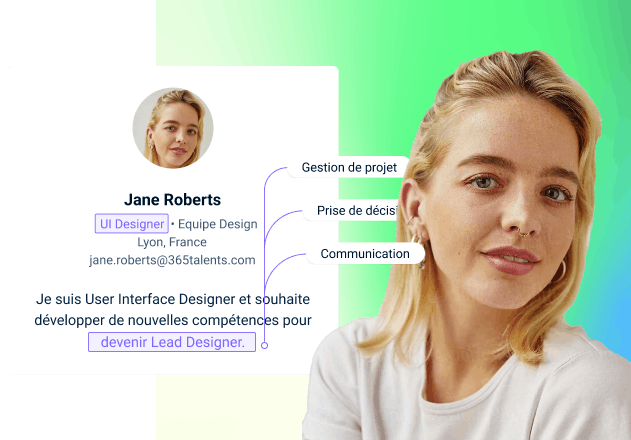
The global talent ecosystem is undergoing a rapid transformation, driven by the changing needs and expectations of the workforce, the increasing complexity and diversity of skills, and the emergence of new technologies and platforms. In order for skills-based organizations to be fueled by data-driven decisions, it involves utilizing various data points and analytics to enhance the overall employee experience and skills management within an organization.
As previously mentioned, analyzing HR data helps organizations impact their employee experience. From the hiring process to offboarding, gathering data on skills, preferences, motivations, engagement rates, and other relevant metrics, empowers HR to: have an accurate skills inventory, identify skills gaps, offer personalized development plans, optimize resources allocation, empower performance management, enhance the employee experience, foster the creation of innovative career trajectories, etc.
Skills Intelligence solutions enable you to build a dynamic and personalized skills framework to get better visibility on your current workforce and build the one of tomorrow. You can use them to:
- Extract and centralize all your skills data to build your skills and job frameworks
- Dynamically enrich your skills frameworks with your employees, offers, job data, and market insights
- Intelligently match skills between employees, jobs, projects, learning opportunities, mentors, etc.
- Recommend personalized learning, and career paths based on skills and interests
- Analyze gaps and trends at individual, team, and organizational levels








However, many organizations still need help to provide a seamless and personalized talent experience for their employees, primarily when they have heavily invested in their core HR systems. HR will probably ask themselves: “Where do I start? What do I already know? What other tool do I need since I started building my HR tech stack? And if I pick a new solution, how can I integrate it into my core HR systems? How can my data be safe?”.
The key is finding a tool that can be seamlessly integrated to your already existing HR core systems. One that can collect and analyze your information and help you make more informed decisions while being completely safe for your HR data.
How can HR initiate data-driven decision-making? A short guide to get started
Introducing data-driven decision-making in HR demands meticulous planning and execution. Here is a short guide to get started:
1. Develop new skills for a new HR
The dynamic and evolving world of work requires HR professionals to develop new skills to contribute to their organization’s goals and help their businesses thrive. According to a report by IBM, 70% of HR executives say the HR function is ripe for reinvention.
New talent management and employee experience strategies need new essential skills that current and future HR, and people analytics professionals, should cultivate to adapt to this era of rapid technological advancement.
To excel in data-driven decision-making, they require a diverse technical and soft skills set. Some of these essential skills are:
- Change management and consulting: HR professionals must pave the way for their teams to make transformational processes more manageable for the organization. They have to be able to lead and support the changes happening in their company, communicate, and reassure their collaborators.
- People Analytics: Also known as HR analytics or workforce analysis, it refers to the use of data and analytics to understand, manage, and optimize various aspects of the workforce within an organization. As their role evolves, a particular understanding of the value data can bring to the organization and the ability to demonstrate it is key.
- Data Literacy: Understanding basic data concepts and being able to interpret it accurately is fundamental. HR professionals should be comfortable with data analysis tools and techniques.
- Statistical Analysis: Proficiency in statistical analysis enables HR professionals to derive meaningful insights from data, identify trends, and make informed decisions.
- Critical Thinking: The ability to critically evaluate data and draw logical conclusions is essential. HR professionals should be able to assess the reliability and relevance of data before using it to make decisions.
- Collaboration: Working collaboratively with colleagues from different departments, including IT and analytics teams is essential for successful data-driven decision-making in HR.
- Ethical Considerations: Understanding the ethical implications of using data in decision-making is essential. HR professionals should adhere to privacy regulations and ensure data is used responsibly and ethically.
- Continuous Learning: The field of data analytics is constantly evolving. HR professionals need to be committed to continuous learning to stay updated on the latest trends, tools, and techniques in data analysis.
Focus on the role of HR data analysts
Understandably, it takes time for Human Resource Leaders to learn and develop new skills, and they can only do so if they have time to allocate to their own development. Organizations often require the expertise of HR analysts to help them effectively utilize data and analytics. Equipped with technical skills and knowledge, HR data analysts extract meaningful insights and convey them to HR leaders and managers. They are crucial in facilitating informed decisions based on objective evidence and steering strategic HR initiatives.
2. Define key metrics and objectives
Start by identifying the key HR metrics that align with your organization’s goals and objectives. They may encompass employee turnover, engagement, performance, and productivity. By establishing clear objectives and KPIs, you can focus on data collection and analysis efforts of areas critical to your organization’s success.
So here are a few examples for you to take a look at when building your data-driven plan:
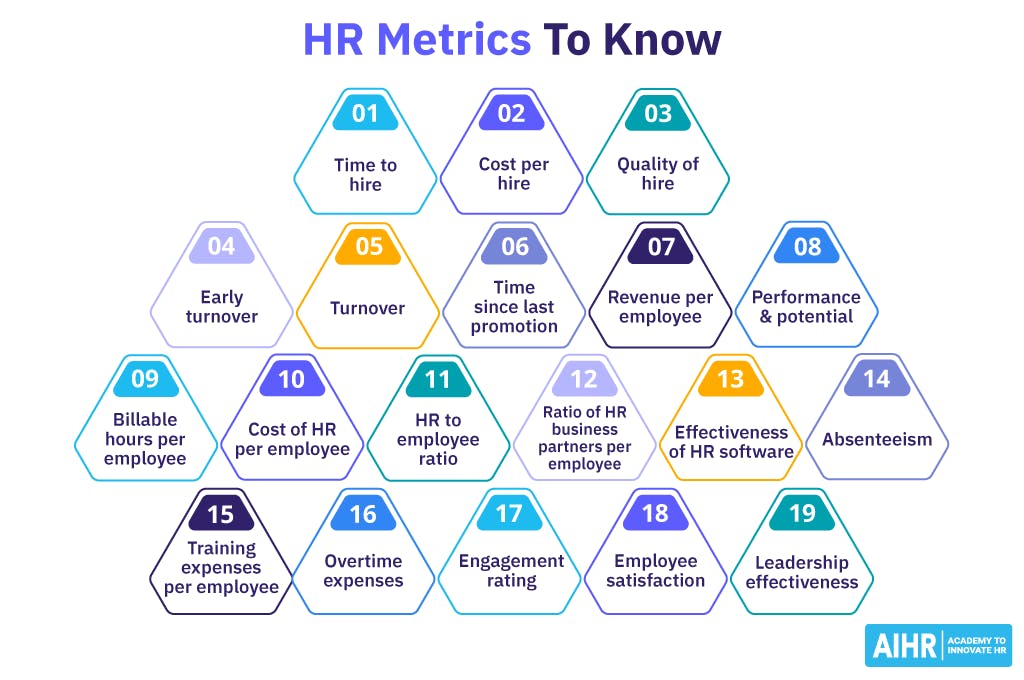
3. Collect and centralize HR data
Aggregating HR data from diverse sources into a unified, centralized system is key. This involves integrating data from HRIS systems, performance management tools, employee surveys, and other relevant sources. Centralizing it ensures accuracy and accessibility, facilitating easier analysis and interpretation.
4. Analyze and interpret data
Once data is centralized, conduct an analysis to derive valuable insights. You can utilize statistical analysis techniques to identify trends, patterns, and correlations within the data. Then, visualize results through charts, graphs, and dashboards to enhance comprehension and communication. This enables to draw meaningful conclusions and to make informed strategic decisions.
5. Implement data-driven actions and interventions
Leverage insights from data analysis to implement targeted interventions. For instance, if analysis indicates a high turnover rate in a specific department, investigate underlying causes and devise strategies for mitigation. These strategies involve improving leadership practices, enhancing employee engagement initiatives, or introducing training and development programs.
6. Monitor and evaluate
Continuously monitor and evaluate the impact of data-driven interventions. Track key HR metrics over time to assess strategy effectiveness and plan interventions as needed based on fresh data and insights. Embracing a continuous improvement mindset ensures HR strategies remain responsive to evolving organizational requirements and workforce dynamics.
But to accomplish that, you might need an HR tool that will make it easy for you. But how do you choose the right HR software?
Choosing the right HR tool for data-driven decisions
To select the right tool to initiate your data-driven decision-making plan, you need to look at what’s the most important for your organization and your workforce planning. Nowadays, one subject comes to mind when depicting the future of the world of work: skills.
Organizations are experiencing a shift from being job-driven to skills-based. It requires a nuanced and thoughtful change management approach that allows your leaders and people to internalize the value of skills as a mindset as much as a talent management strategy. And for good reason, as SBOs are more inclined to thrive in today’s disruptive markets.
You need to understand the skills of your employees and empower them with personalized learning and career suggestions. Yet, you may be hesitant to adopt a new platform due to concerns of change management overload. You are satisfied with your current HR systems and want to enhance them with Skills Intelligence and intelligent AI matching & suggestion capabilities. The following questions may resonate with you:
- How can I do that without adding another platform to your existing talent ecosystem?
- How can I avoid the change management overload that comes with implementing new solutions?
- How can I leverage the data and systems that you already have to create a better talent experience?
At 365Talents, we provide a complete set of Skills Intelligence APIs to bring skills extraction, identification, matching, and other essential Talent Experience capabilities, based on dynamic Skills Intelligence, to collect and centralize all of your organization’s skills and enhance your talent experience. Combining 365Talents unique Workforce Intelligence capabilities, our API-first approach has many benefits for your organization:
- Build the Talent Experience you want, fully customized and thoroughly adapted to your business and HR rules.
- Leverage 365Talents technology with our proven experience of multiple successful deployments, serving millions of users across various industries.
- Limit change management for Users: New experience, Same environment, for an optimized adoption.
Through APIs, provide 365Talents Skills Intelligence (inference, management, translation, dynamic ontology, analytics), smart matching, and suggestions to your core HR tools for a better skills application.
How do we do it? Find out!
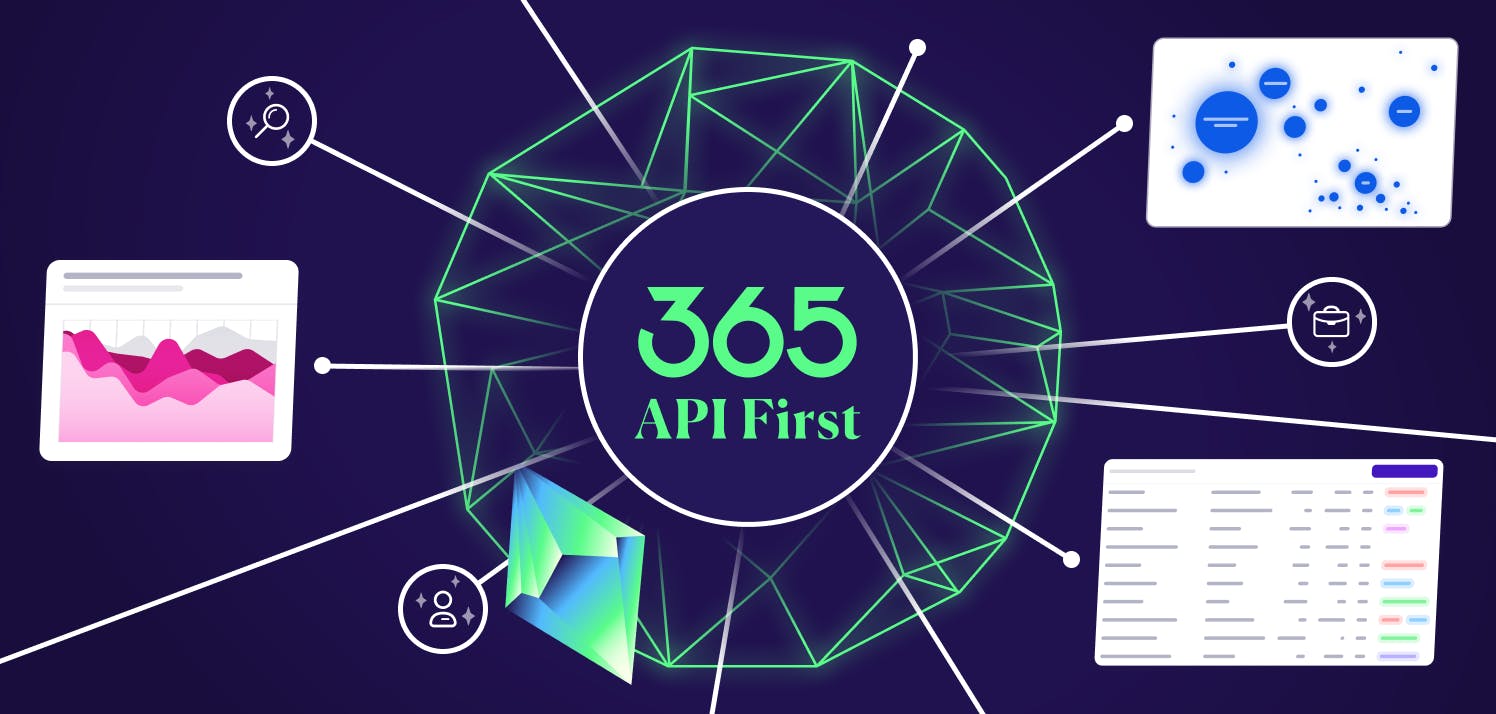
How 365Talents helps you make more informed decisions with Skills Intelligence API?
Empowering your decision-making with strategic insights
Among 365Talents Skills Intelligence APIs, 365Talents provides Workforce Intelligence capacities, leveraging over seven years of working experience with customers. The Workforce Intelligence platform serves as a centralized hub for skills data and workforce analysis, providing you with the tools needed to manage your workforce effectively. Our solution empowers you with actionable insights, comprehensive dashboards, and data visualizations across various levels of visibility. This proactive approach enables the early identification of skill gaps in the present and future.
Furthermore, you can seamlessly connect employee and job frameworks to enhance the quality of your insights, analysis, and suggestions. The platform enables you to map, analyze, and stay up-to-date on roles and responsibilities using both internal and external data sources, allowing you to visualize their evolution and optimize your talent management strategies, while ensuring that your workforce remains agile and well-prepared for the evolving demands of the market.
Building personalized and dynamic Skills and Job Frameworks
365Talents Skills Intelligence APIs support your transformation journey to become a skills-based organization as it accelerates skills and job mapping by deconstructing the workforce into its core elements: skills. What sets 365Talents apart is our commitment to empowering employees to describe themselves and their roles in their own words in over 45 different languages. 365Talents’ AI constructs a 100% personalized framework, drawing from all available data within your organization, whether it's structured or not. This includes existing skills databases, job and project descriptions, performance interviews, and more.
Moreover, our real-time AI interaction capabilities seamlessly integrate with user-facing systems. Users can describe a project within their system and instantly receive skill suggestions based on the text they input. The result is an open and personalized skills framework that faithfully reflects your company's specificities and realities.
Our AI is not only multilingual but also multifaceted, with the capability to detect skills, comprehend nuanced experience descriptions, organize intricate skills frameworks, and make precise matches between skills, opportunities, and talents. This approach provides a truly dynamic and personalized understanding of your workforce, fostering an agile environment where every skill counts.
Enhancing your HRIS with smart matching and suggestions
365Talents' AI matching automates and expedites the matching process by providing smart suggestions to the best profiles, uncovering hidden gems in your employees' skills and motivations. These suggestions come with clear explanations showcasing the commonalities and transferable skills between opportunities and employees. This ensures more informed and strategic staffing decisions, guaranteeing that suitable candidates are placed in the perfect roles when needed.
Additionally, 365Talents' APIs solution fosters meaningful discussions about professional aspirations, empowering your employees to take ownership of their careers and close skill gaps. It shows the learning paths that lead individuals to their desired destinations and offers intelligent skill suggestions to maintain up-to-date employee profiles.
Supercharging your current tools
Skills are widespread and constantly evolving, acquired through formal training and everyday work experiences, whether on an ATS tool or collaboration platform. 365Talents can connect to your HRIS and all HR solutions, excelling at harvesting skills insights from wherever they can be found and seamlessly making this information available exactly where it's needed. Our meticulously documented API effortlessly integrates with your HR and workplace software, ensuring a smooth and harmonious alignment with your existing tooling stack. Most importantly, this integration has zero impact on the user experience: you can continue using the same tools while we enhance them with the power of skills and AI.
A solution that keeps all your HR data safe
HR data is the most sensitive information in your organization. 365Talents was built with data security and privacy policies integrated into the platform design. Our data practices are regulatory compliant internationally and go beyond the legal requirement to offer your people impenetrable protection and customizable control over data collection.
All data gathered through 365Talents is fully encrypted at the infrastructure level, and undergoes routine security audits, and gray box pentest by clients and third-party teams to ensure its safety. Additionally, we are also SOC2 certified.
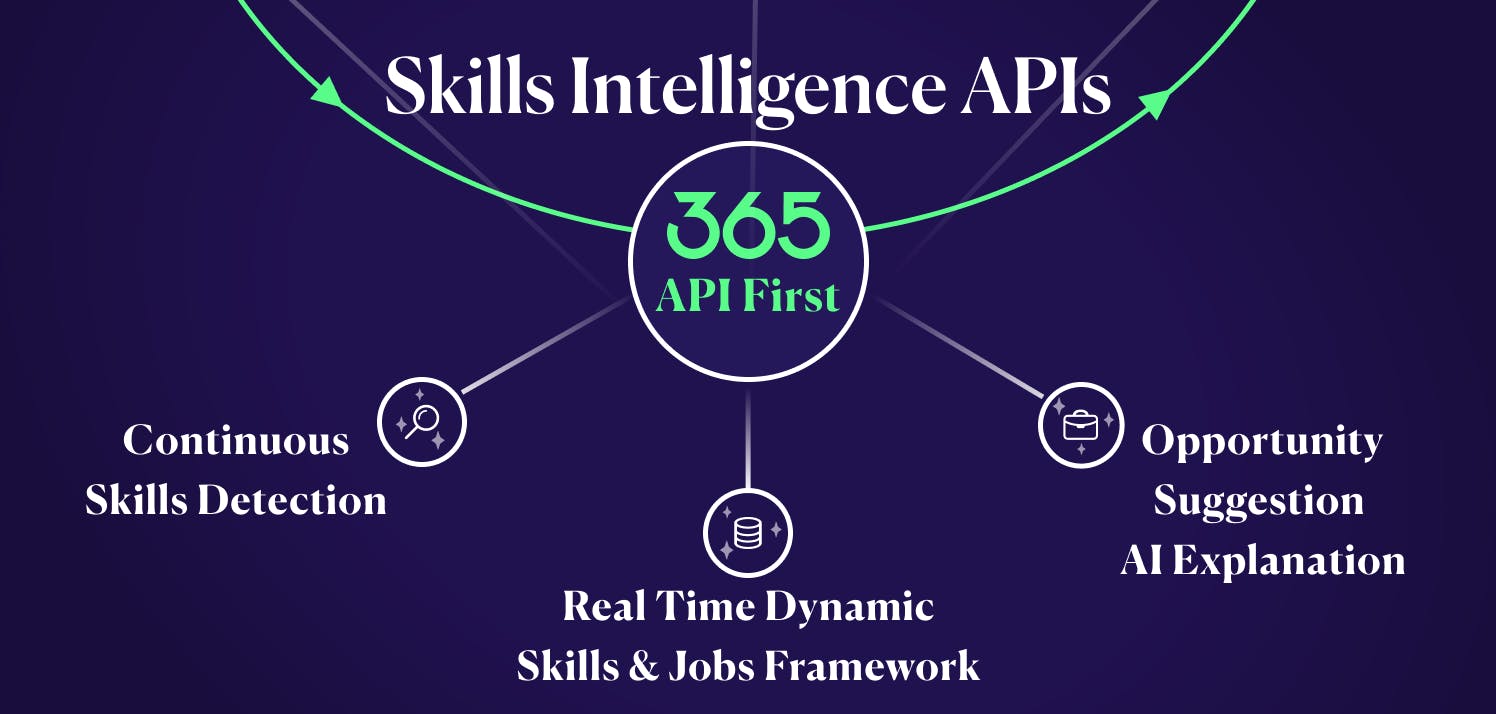
How our customers use 365Talents Skills Intelligence APIs
Leaders from different industries across the world already have existing and well-structured HR ecosystems. But to fully transform into skills-based organizations, they use our Skills Intelligence APIs in order to:
- Improve effectiveness in talent placement
- Increase retention of high performers
- Provide visibility on career paths
- Improve employee experience
- Anticipate change and be able to respond efficiently and effectively.
By adding Skills Intelligence capabilities, they can integrate skills declaration and extraction, smart suggestions, skills gaps, and workforce analysis into their existing libraries. Customers have now a dynamic skills ontology linked to jobs, a clear identification of relevant employees for a specific job based on skills, and clear visibility on their current strengths and gaps at the strategic level.
To read the full success story, click here!
Utilizing data-driven decision-making in HR can revolutionize organizations, empower HR leaders and managers to make well-informed decisions, streamline HR operations, and elevate the employee experience. Through the collection and analysis of HR data, organizations can extract valuable insights into their workforce dynamics, enabling targeted interventions to enhance performance, engagement, and productivity. Adopting a data-driven mindset positions organizations for success in today's competitive business environment.
As we journey through continuous digital transformations, striking the ideal balance between human involvement and AI automation within HR operations is essential to fully leverage the potential of these technological advancements. We can’t forget the H(uman) in “HR,” as its role and expertise will always be essential to ensure human processes and fair practices. Humans understand humans the best.







